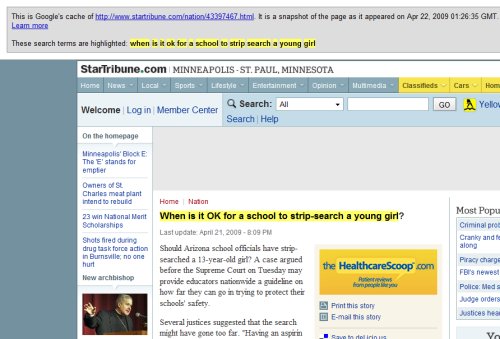Here’s a passage from a recent article in the L.A. Times, which is supposedly about a growing problem
with alcohol-related offenses by L.A. county sheriff’s deputies. (Actually, what’s growing is the number of police reports of offenses by deputies, not necessarily the number of offenses actually committed. It used to be that L.A. cops would hardly ever report it when they encountered one of their gang brothers drunk and doing something dangerous. Professional courtesy
and all that. What’s changed is that the department got some bad P.R. a few years back when a drunken cop started waving his gun around and got his cousin shot. So now they are actually starting to put these things on the books.)
Michael Gennaco, the head of the [County of Los Angeles Office of Independent Review], said alcohol-related arrests have nearly tripled since 2004. Alcohol-related incidents in 2009 are at the same pace as last year, he said.
. . . Gennaco’s report also cited two cases in which deputies drew their guns after coming out of bars. In one case, a deputy followed a bar hostess to her car, flashed his badge, told her he’d like to molest her
and kissed her on the neck. He displayed his handgun before kissing her again, according to the report. The deputy pleaded no contest to a misdemeanor charge of disturbing the peace and was suspended for 15 days, the report said.
— Richard Winton, Los Angeles Times (2009-04-16): Alcohol a growing problem in the L.A. County Sheriff’s Department, report says
Actually, the newspaper’s summary is kinder to the cop than he deserves. Here’s the full account from the OIR’s full report:
A deputy met a few friends at a bar and struck up a conversation with the bar's hostess. At approximately 1:30 a.m., the hostess left work. The deputy saw the hostess crossing the street toward a parking garage and offered to walk her to her car.
The hostess declined the offer and encouraged the deputy to rejoin his friends. He then told the hostess that he was a cop.
As the hostess continued to walk away from the deputy, he showed her his Department identification card. As the deputy continued to follow her to the dark secluded parking garage, she became increasingly nervous and scared.
As they entered the parking garage, the deputy turned to the hostess and said, You're young
and beautiful, and you probably get this all the time, but I'd really like to molest you. But I'm
too nice.
The hostess became even more fearful. The deputy then requested a kiss from the hostess, which she declined. The deputy then placed his right hand at the center of the hostess' back, leaned over and kissed her neck. She moved her head away and told the deputy a second time that he did not have to walk her to her car. He responded that it was okay.
Inside the parking garage, the deputy stated again, Yeah, I'd really like to molest you, but I'm too nice.
Then, the deputy asked her whether it looked like he had a gun on him. The hostess replied, That's creepy.
The deputy then asked the hostess whether she wanted to see it–and even though the hostess told him no—the deputy reached into his pant pocket, removed a black semi-automatic handgun and showed it to her. As she neared her car, the hostess thanked the deputy for walking with her and said goodbye. The deputy then moved closer to her and while still holding the handgun in his right hand, kissed her again on the neck. The hostess quickly got into her car and drove out of the parking garage. While she drove off, the hostess saw the deputy standing in the same spot, holding the gun and looking around.
The hostess reported the incident to a local police agency. The case was investigated and presented to a City Attorney's office. The deputy was ultimately charged with one count of battery. Rather than proceed to trial, the deputy pled nolo contendere to an amended charge of disturbing the peace/causing loud noise.
After the criminal conviction, the Department administratively investigated the incident and found that the deputy had violated Department policies. The Department suspended the deputy without pay for 15 days.
— County of Los Angeles Office of Independent Review (April 2009): Seventh Annual Report
Of course, the real problem here has more or less nothing to do with alcohol. The problem has to do with a set of legal privileges, a police culture, and an institutional environment where this male deputy could realistically expect that even if he chased a woman trying to get away from him, told her that he’d like to molest
her, intimidated her by brandishing his physical advantages and his legal authority, and then forced unwanted sexual contact on her, while she repeatedly said No
— and even if he then brandished his gun and forced unwanted sexual contact on her again, even as she continued to say No
and tried to get away from the predatory creep — that, after all this had come to light, he’d have no problem staying on at his job, or continuing to carry the badge and the gun that he so eagerly showed off as tools of sexual coercion, and that he would in fact face no personal consequences at all for terrorizing and sexually assaulting a woman, above and beyond pleading out on a misdemeanor nuisance charge, and being given a two week vacation from his job.
The L.A. county sheriff’s office doesn’t have a drinking problem. It has a power problem, and the reason for the problem has a lot to do with the fact that if a deputy turns out to be a creep who abuses his position of power — including male deputies who turn out to get off on using their weapons and their position of power to harass, intimidate, and sexually assault women — there will be no serious attempt to hold them accountable for anything that they may do.
See also:

